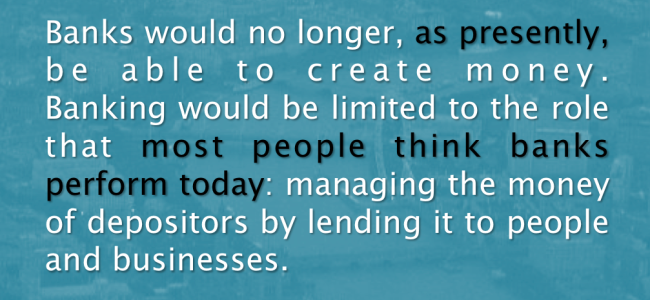How Can We Do Better? The Alternative: Public Money Creation
A well-functioning monetary system is essential for a well-functioning economy and thereby, for the common good. The state is the agency responsible for the public interest. The responsibility for and control over the monetary system and money creation should therefore be placed with the state and not with private, profit-oriented enterprises. The logical alternative to money creation by private banks, therefore, is money creation by the state. In such a system it’s not only coins and paper money that are created by the state but also the non-cash money now created by private banks. Meaning electronic money is then created by the same agency now responsible for coins and paper money.
Reform of the monetary system should lead to a more transparent management of the money supply with as its primary aim the short and long term common good, not private profit. Under the new system the responsibility for money creation would rest with a public monetary authority acting according to statutory objectives and guidelines. Such an authority already exists in most countries: the central bank. It would therefore be logical to give the money creation mandate to the central bank. In the following the terms monetary authority and central bank are used interchangeably.
At the same time the right of private banks to create money would be taken away. Banks would no longer, as presently, be able to create money by the simple accounting exercise linked to lending. Rather than creating their own money they would have to work with money created by the central bank. Such money would come from deposits, money borrowed from the central bank or in financial markets, and the bank’s equity. Banking would be limited to the role that most people think banks perform today: managing the money of depositors by lending it to people and businesses willing to borrow it.
…click on the above link to read the rest of the article…